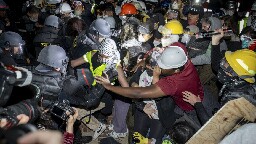Police officer fired gun while clearing protesters from Columbia building, prosecutors say



apnews.com
A police officer who was involved in clearing protesters from a Columbia University administration building earlier this week fired his gun inside the hall, a spokesperson for District Attorney Alvin Bragg’s office confirmed Thursday.
No one was injured, according to spokesperson Doug Cohen, who said there were other officers but no students in the immediate vicinity. He said Bragg’s office is conducting a review.
He did not provide additional details on the incident, which was first reported by news outlet The City.
The New York Police Department did not immediately respond to The Associated Press’ request for comment.
You are viewing a single comment
Technically any unintended discharge of a gun is a negligent discharge because the user isn't following the 4 rules of gun safety. The trigger dongle makes a glock drop safe, but not safe from idiots putting their finger on the trigger (where most NDs happen).
It's even worse since the NYPD has absurd trigger pull weight.
Yeah, 12lbs is crazy.
I may have misused the term, thanks. As far as the split trigger my understanding is that's for cases where your finger or other object unintentionally partially pulls the trigger.
There's an additional safety on glocks for drops where the firing pin is blocked by the trigger bar unless the trigger is pulled in a manner that satisfies the split trigger mechanism.
Yeah no problem - not to get too deep in the weeds, but the glock trigger is intended to fire a round whenever you have your finger on the trigger and pull it. In other words, if you pull the trigger, it will go bang. The trigger dongle is not meant to function as a safety device if you are pulling the trigger partially.
In general, the only safety feature of triggers is a long and hard pull weight, commonly seen on "double action / single action" (DA/SA) guns like the Sig P226. The double action refers to 1) cocking the hammer, then 2) releasing the hammer. Glocks are all striker fired, which means they only have a single action (releasing the firing pin, no hammer). That means that each trigger pull on a Glock is the same, in contrast to DA/SA guns where the first pull is extremely hard, then each pull after that (because the hammer is then cocked) is very light. This is considered a safety feature because you have to be very intentional about your first shot, but once you know you're going to be shooting, other shots are easy.
What's weird, as the other commenter mentioned, is that NYPD makes glock install a super heavy trigger in their glocks so they all basically function as a safety. However, the dongle doesn't impact that at all - it's just a tiny little flap that instantly folds with no pressure.
The firing pin block is indeed a safety device too, but it's unconnected to the trigger dongle per se (there's no mechanical connection). A firing pin block does block the firing pin from moving forward. On a glock (and similar striker fired guns with trigger dongles), the movement of the trigger (let's say 50% through the pull) pushes the firing pin block up so that the firing pin is free to impact the bullet (once the trigger is pulled 100%). The trigger dongle's job is to prevent the trigger from STARTING to move at all, thus keeping the firing pin block in place - the difference in weight between the dongle and the trigger is what makes them drop safe (in contrast, see early sig p320 designs, which were not drop safe because there was no dongle).
Edit: btw, that's why good trigger discipline (example) is extremely important for glocks, since you have no external safety (and outside the NYPD, a relatively light trigger weight).
TIL
Thank you.